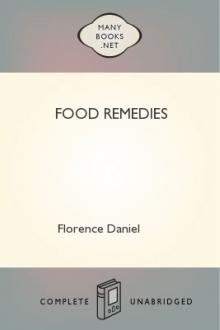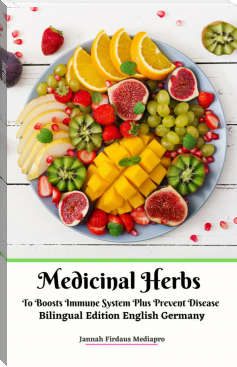Food Remedies, Florence Daniel [jenna bush book club .TXT] 📗

- Author: Florence Daniel
- Performer: -
Book online «Food Remedies, Florence Daniel [jenna bush book club .TXT] 📗». Author Florence Daniel
Fruit should always be eaten at the beginning of a meal. Again, when the diet consists of a mixture of cooked and uncooked foods, the uncooked should always be eaten first. Also when the meal consists of two courses, a sweet and a savoury dish, sufferers from indigestion should try taking the sweet course first. I have known several cases where this simple expedient has resulted in a complete cessation of the discomfort of which the patient complained.
A Pioneer of Food Remedies.
The pioneer, in England, of the treatment of all sorts and conditions of disease by means of a vegetable (chiefly fruit) dietary was Dr. Lambe, a contemporary of the poet Shelley. His last book appeared in 1815, and in it and the one preceding are recorded some wonderful cures, especially in cases of cancer. It is only fair to add here that in Dr. Lambe's opinion no system of cure is completely efficacious so long as the patient is allowed to drink the ordinary tap or well water. Distilled water was the only drink he advised. But he held it better still not to drink at all if the necessary liquid could be supplied to the body by means of fresh, juicy fruits. He contended that man is not naturally a drinking animal; that his thirst is a morbid symptom, the outcome of a carnivorous diet and other unwholesome habits. And I think that anyone may prove the truth of this for him or herself if he or she will adopt a fruitarian dietary and abstain from the use of salt and other condiments.
I have cited so out-of-date a personage as Dr. Lambe for two reasons. The first is that I know many of the so-called new and unorthodox ideas are more likely to appeal to some readers, if it can be shown that they originated with a duly qualified medical practitioner who recorded the results of his observations and experiments in black and white. The second is that the principles and practices of Dr. Lambe are incorporated with those of the Physical Regeneration Society, a large and ever-increasing body of enthusiasts having its head-quarters in London, to whose annals I must refer those readers who desire up-to-date instances of the efficacy of the use of fruit in disease. Lack of space will not allow me to quote them here.
The Simple Life.
We hear a great deal about the "Simple Life" and "Returning to Nature" nowadays, but most of us are so situated that the proposed simplicity simply spells increased complexity. The "vegetarian chop" costs the housewife more than double the time and labour involved in preparing its fleshly namesake. And when it comes to illness some of the systems of bathing and exercising prescribed by the "naturopath" are infinitely more troublesome to the patient and his friends than the simple expedient of sending for the doctor and taking the prescribed doses. I do not want to be misunderstood here. I am not condemning treatment with water and exercises. On the contrary, I hope to pass on what I have learnt about these methods of treatment. But so many people lack the time, help, and conveniences necessary to carry them out successfully. It is to these that I would say that the patient's cure may be effected just as surely, if more slowly, by means of fruit alone.
Fruit or Fasting.
Treatment of disease by fasting has come into fashion of late, and there is really no lack of proof as to the benefits to be obtained from abstaining entirely from food for a short period. I know of an elderly man who fasts for a fortnight every spring, and gains, not loses, weight during the process! He accounts for this by explaining that certain stored up, undigested food particles come out and are digested while he fasts. Whether this is the correct explanation I do not know, but the fact remains, and it is not by any means a solitary case. Of course, the majority of people lose weight when fasting, but this is very quickly recovered. Now I do not think fasting should be undertaken recklessly, but only under competent direction. But an excellent and safe substitute for a fast is an exclusive fruit diet.
Acute Illness.
The simplest and quickest method of recovering from attacks of acute illness, fevers, inflammatory diseases, etc., is to rest quietly in bed in a warm but well-ventilated room, and to take three meals a day of fresh ripe fruit, grapes by preference. If the grapes are grown out of doors and ripened in the sun so much the better. I have found from two to three pounds of grapes per day sufficient. If there is thirst, barley water flavoured with lemon juice should be taken between the meals.
Part II.—FOODS AND THEIR MEDICINAL USES Almond.Almond soup is an excellent substitute for beef-tea for convalescents. It is made by simply blanching and pounding a quarter of a pound of sweet almonds with half a pint of milk, or vegetable stock. Another pint of milk or stock is then to be added and the whole warmed. After this add another pint and a half of stock if the soup is to be a vegetable one, or rice water if milk has been used.
An emulsion of almonds is useful in chest affections. It is made by well macerating the nuts in a nut butter machine, and mixing with orange or lemon juice.
Almonds should always be blanched, that is, skinned by pouring boiling water on the nuts and allowing them to soak for one minute, after which the skins are easily removed. The latter possess irritating properties.
Bitter almonds should not be used as a food. They contain a poison identical with prussic acid.
Apple.It is hardly possible to take up any newspaper or magazine now a days without happening on advertisements of patent medicines whose chief recommendation is that they "contain phosphorus." They are generally very expensive, but the reader is assured that they are worth ten times the price asked on account of their wonderful properties as nerve and brain foods. The proprietors of these concoctions seemingly flourish like green bay trees and spend many thousands of pounds per annum in advertising. From which it may be deduced that sufferers from nervous exhaustion and brain fag number millions. And surely only a sufferer from brain fag would suffer himself to be led blindly into wasting his money, and still further injuring his health, by buying and swallowing drugs about whose properties and effects he knows absolutely nothing. How much simpler, cheaper, and more enjoyable to eat apples!
The apple contains a larger percentage of phosphorus than any other fruit or vegetable. For this reason it is an invaluable nerve and brain food. Sufferers from nerve and brain exhaustion should eat at least two apples at the beginning of each meal. At the same time they should avoid tea and coffee, and supply their place with barley water or bran tea flavoured with lemon juice, or even apple tea.
Apples are also invaluable to sufferers from the stone or calculus. It has been observed that in cider countries where the natural unsweetened cider is the common beverage, cases of stone are practically unknown. Food-reformers do not deduce from this that the drinking of cider is to be recommended, but that even better results may be obtained from eating the fresh, ripe fruit.
Apples periodically appear upon the tables of carnivorous feeders in the form of apple sauce. This accompanies bilious dishes like roast pork and roast goose. The cook who set this fashion was evidently acquainted with the action of the fruit upon the liver. All sufferers from sluggish livers should eat apples.
Apples will afford much relief to sufferers from gout. The malic acid contained in them neutralises the chalky matter which causes the gouty patient's sufferings.
Apples, when eaten ripe and without the addition of sugar, diminish acidity in the stomach. Certain vegetable salts are converted into alkaline carbonates, and thus correct the acidity.
An old remedy for weak or inflamed eyes is an apple poultice. I am told that in Lancashire they use rotten apples for this purpose, but personally I should prefer them sound.
A good remedy for a sore or relaxed throat is to take a raw ripe apple and scrape it to a fine pulp with a silver teaspoon. Eat this pulp by the spoonful, very slowly, holding it against the back of the throat as long as possible before swallowing.
A diet consisting chiefly of apples has been found an excellent cure for inebriety. Health and strength may be fully maintained upon fine wholemeal unleavened bread, pure dairy or nut butter, and apples.
Apple water or apple tea is an excellent drink for fever patients.
Apples possess tonic properties and provoke appetite for food. Hence the old-fashioned custom of eating an apple before dinner.
Apple Tea.The following are two good recipes for apple tea:—(1) Take 2 sound apples, wash, but do not peel, and cut into thin slices. Add some strips of lemon rind. Pour on 1 pint of boiling water (distilled). Strain when cold. (2) Bake 2 apples. Pour over them 1 pint boiling water. Strain when cold.
Asparagus.Asparagus is said to strengthen and develop the artistic faculties. It also calms palpitation of the heart. It is very helpful to rheumatic patients on account of its salts of potash. It should be steamed, not boiled, otherwise part of the valuable salts are lost.
Banana.The banana is invaluable in inflammation of all kinds. For this reason it is very useful in cases of typhoid fever, gastritis, peritonitis, etc., and may constitute the only food allowed for a time.
Not only does it actually subdue the inflammation of the intestines, but, in the opinion of at least one authority, as it consists of 95 per cent. nutriment, it does not possess sufficient waste matter to irritate the inflamed spots.
But great care should be taken in its administration. The banana should be thoroughly sound and ripe, and all the stringy portion carefully removed. It should then be mashed and beaten to a cream. In severe cases I think it is better to give this neat, but if not liked by the patient a little lemon juice, well mixed in, may render it more acceptable. It may also be taken with fresh cream.
A friend who has had a very wide experience in illness told me that she was once hurriedly sent for at night to a girl suffering from peritonitis. Not knowing what she might, or might not, find in the way of remedies when she arrived at her destination, my friend took with her some strong barley water, bananas, and an enema syringe. She found the girl lying across the bed screaming, obviously in agony. First of all my friend administered





Comments (0)